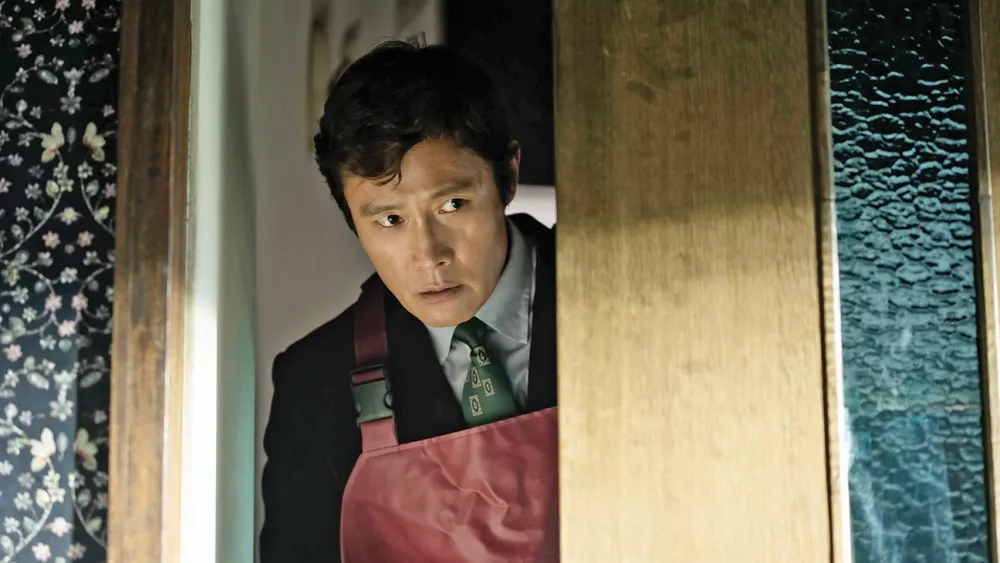No Other Choice Review – Park Chan-wook’s Satirical Thriller Balances Visual Splendor with Slapstick Missteps
In No Other Choice (Eojjeol Suga Eopda), acclaimed Korean director Park Chan-wook returns with a blackly comedic take on desperation, ambition, and corporate absurdity.
In No Other Choice (Eojjeol Suga Eopda), acclaimed Korean director Park Chan-wook returns with a blackly comedic take on desperation, ambition, and corporate absurdity. Lee Byung-hun, reprising his ability to combine gravitas with charm, stars as Man-su, a man pushed to extreme measures when unemployment threatens everything he holds dear. Though the film dazzles visually and delights in clever set pieces, it occasionally undercuts its darker themes with broad humor that softens the narrative edge.

The Bottom Line:
Visually inventive and witty, though tonally uneven at times.
Venue: Venice Film Festival (Competition)
Cast: Lee Byung-hun, Son Ye-jin, Park Hee-soon, Lee Sung-min, Yeom Hye-ran
Director: Park Chan-wook
Screenwriters: Park Chan-wook, Lee Kyoung-mi, Don McKellar, Jahye Lee, based on Donald E. Westlake’s novel The Ax
Runtime: 2h 19m
A Desperate Man in a Corporate Jungle
The story follows Man-su, a loyal employee of a paper mill who, after 25 years of service, is blindsided by sudden retirement. A meticulously planned birthday celebration for his wife Miri (Son Ye-jin) sets up an idyllic domestic tableau — cherry blossoms drift in the garden, the kids frolic, and the family’s golden retrievers bask in the affection. Yet, Park immediately reminds us that tranquility is fleeting: a symbolic gift from management, an expensive eel, signals Man-su’s forced exit.
What follows is a bleak yet darkly humorous journey through unemployment, failed interviews, and the humiliations of a shifting job market. Despite trying to maintain dignity, Man-su finds himself stacking boxes at a big-box store over a year later. Meanwhile, Miri adjusts the family budget, cuts luxuries, and readies the house for sale, underscoring the relentless pressures of financial survival.
From Ordinary Man to Hapless Killer
Man-su’s growing desperation finds a sinister outlet when he identifies a path to reclaiming a coveted job at Moon Paper. His former subordinate, Choi Sun-chul (Park Hee-soon), now a cocky competitor, becomes the target of Man-su’s increasingly absurd murder schemes. Park Chan-wook navigates this descent into criminality with a mixture of empathy and comedy. Despite the ridiculousness of some situations — from stakeouts in muddy fields to accidental snake bites — Man-su’s underlying decency remains intact, making his misadventures both funny and oddly sympathetic.
The obstacles Man-su faces include two fellow unemployed men: Gu Bummo (Lee Sung-min), a man drowning his failures in alcohol, and Go Sijo (Cha Seung-won), a mild-mannered shoe salesman with a genuine passion for the paper industry. Even amid dark humor, Park treats these characters with tenderness, portraying the erasure of identity that comes with job loss.
Visual Flourish and Tonal Juxtaposition
Park Chan-wook’s trademark visual mastery is on full display. The film sparkles with inventive camera angles, bold zooms, and striking compositions, and quirky architectural details of Man-su’s home add charm to otherwise tense sequences. Yet, the film’s tonal shifts — veering from suspenseful thriller to outright slapstick — occasionally undermine the narrative stakes.
Lee Byung-hun handles the physical comedy with charm and awkward grace, skillfully balancing the duality of a man torn between moral integrity and homicidal schemes. Even when the middle portion of the film gets a little bonkers, the final act restores tension and delivers an inventive, satisfying resolution, aided by Miri’s decisive intervention.
Legacy and Context
No Other Choice is Park’s long-gestating adaptation of Donald E. Westlake’s The Ax, previously envisioned as an English-language project with Costa-Gavras. The multi-writer credits, including Canadian filmmaker Don McKellar, may explain the film’s occasional tonal unevenness. Nevertheless, Park brings a distinct visual signature and moral sensibility that elevate the story, even when broad comedy intrudes.
While No Other Choice may stumble with its comedic detours, it remains a compelling showcase of Park Chan-wook’s visual ingenuity and narrative inventiveness. Lee Byung-hun anchors the film with a sympathetic, nuanced performance as a man driven to extremes by forces beyond his control. The movie is a satirical reflection on corporate absurdity, social pressures, and human resilience — and, yes, it also features two remarkably charming golden retrievers that provide unexpected heart.
